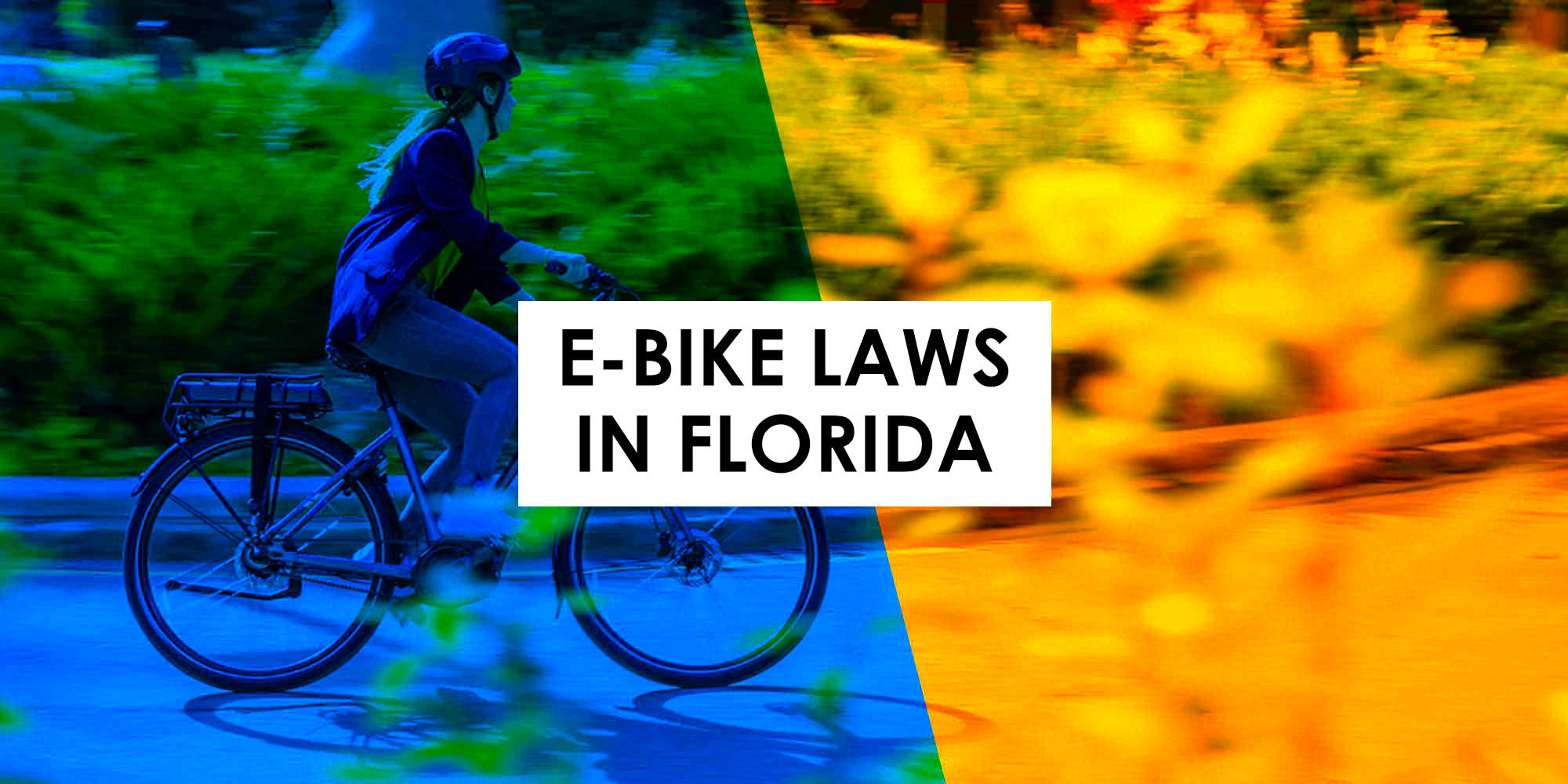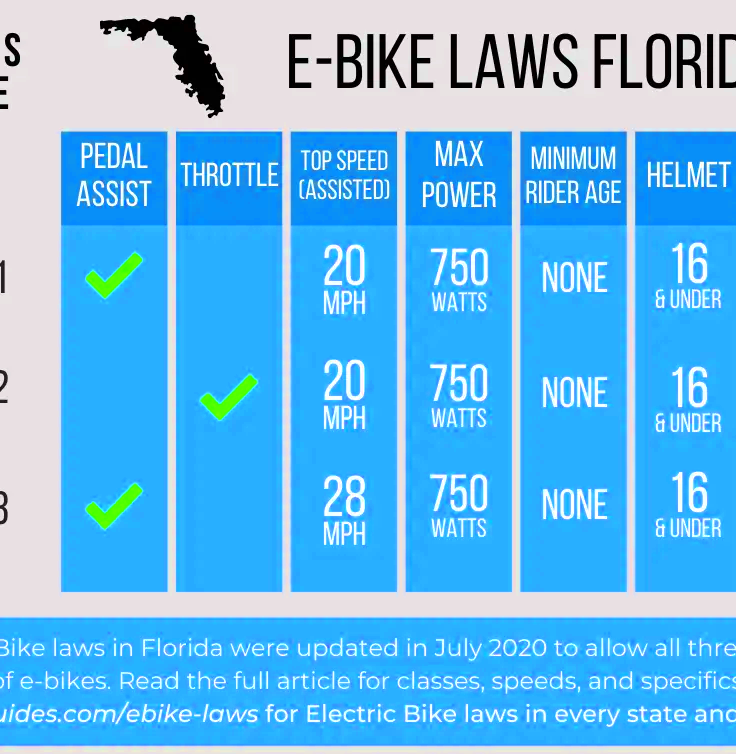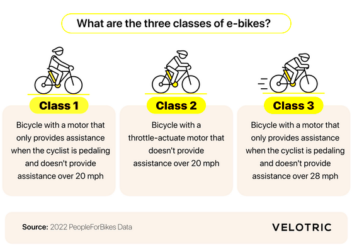Electric Bike Laws in Florida and Legal Considerations for Riders
Florida is a popular state for electric bike riders, but it’s essential to understand the laws that govern their use. Whether you’re commuting or riding for fun, staying within the legal boundaries ensures a safer experience on the road. In Florida, electric bike laws are designed to balance rider freedom with safety and public order. These laws classify electric bikes and outline rules on where and how they can be ridden. Understanding the basic legal requirements is the first step for every rider to avoid penalties and enjoy a hassle-free ride.
Electric Bike Classifications in Florida

Florida follows a three-tier classification system for electric bikes, similar to many other states. Knowing these classes helps riders stay compliant with the law:
- Class 1: These bikes have a motor that assists the rider only when pedaling and cuts off at 20 mph.
- Class 2: These bikes come with a throttle, allowing the rider to control the motor without pedaling, but the speed is also capped at 20 mph.
- Class 3: These are pedal-assist bikes with motors that help up to 28 mph. Riders of these bikes must be more cautious as they have stricter regulations.
The classification not only determines speed but also where these bikes can be ridden, such as bike lanes, sidewalks, or roadways. Being aware of the classification system helps you choose the right electric bike and ride it responsibly in different areas of Florida.
Age Restrictions and Helmet Requirements
Florida enforces age restrictions and helmet laws to ensure the safety of electric bike riders. Here’s what you need to know:
| Age Group | Helmet Requirement |
|---|---|
| Under 16 | Mandatory |
| 16 and Above | Optional (but recommended for safety) |
While riders aged 16 and above are not legally required to wear helmets, it’s always a good idea to prioritize safety by wearing one. For younger riders under the age of 16, wearing a helmet is mandatory. Parents or guardians can face fines if minors are caught riding without a helmet.
In addition, riders under the age of 16 are not allowed to operate Class 3 electric bikes, as these are faster and require more control and awareness. Keeping these laws in mind will help you and your family stay safe while enjoying your ride.
Where You Can Ride Electric Bikes in Florida
Knowing where you can legally ride an electric bike in Florida is crucial for staying safe and avoiding fines. Florida law is relatively flexible, allowing riders to use electric bikes in several places, but there are some rules and restrictions you need to follow. Whether you’re cruising on the beach or navigating city streets, being aware of these guidelines will help you make the most of your ride while staying within legal limits.
Here’s a breakdown of where you can ride:
- Bike Lanes: Electric bikes, especially Class 1 and 2, are permitted in bike lanes across Florida. Class 3 bikes, due to their higher speed, may be restricted in some areas.
- Sidewalks: Electric bikes are generally not allowed on sidewalks unless specified by local ordinances. In some cities, riding on sidewalks is permitted, but only at a pedestrian’s pace.
- Roads: Electric bikes can be ridden on public roads, but riders must adhere to the same rules as other vehicles, including traffic signals and signs. Use bike lanes when available, but if riding on the road, stay to the right side of the lane.
- Trails: Some recreational trails allow electric bikes, but it’s always a good idea to check local rules. Class 1 bikes are more commonly permitted on multi-use paths than Class 3 due to their lower speed.
Before heading out, always check for local regulations, as some cities may have stricter rules on where electric bikes are allowed.
Licensing and Registration Rules for Electric Bikes
One of the benefits of riding an electric bike in Florida is that the state does not require licensing or registration for most models. This makes owning and operating an electric bike much simpler than a traditional motor vehicle. However, understanding the specific regulations is still essential to avoid any legal complications.
Here’s what the law says:
- No License Required: In Florida, you do not need a driver’s license to ride an electric bike, as long as it falls under the Class 1, 2, or 3 categories.
- No Registration Needed: Unlike motorcycles or mopeds, electric bikes do not require registration with the Department of Motor Vehicles (DMV).
- Insurance: There’s no legal requirement for electric bike insurance, but it might be a good idea to get coverage for theft, damage, or liability, especially for higher-end models.
This lack of licensing and registration makes electric bikes a great, low-maintenance option for getting around Florida. However, just because licensing isn’t required doesn’t mean you should ignore the rules of the road. Always ride responsibly and stay updated on any changes to local regulations.
Speed Limits and Safety Regulations
While electric bikes offer riders an efficient and fun way to travel, it’s important to stay within Florida’s speed limits and follow all safety regulations. The laws surrounding speed are designed to protect both riders and others on the road, ensuring everyone has a safe experience.
Here are the key speed limits for electric bikes in Florida:
- Class 1 and 2: Electric bikes in these categories have a maximum speed of 20 mph. Riders can use pedal assist or throttle, but once this speed is reached, the motor cuts off.
- Class 3: Class 3 electric bikes are faster, with a maximum speed of 28 mph. Due to the higher speed, these bikes are restricted from some bike lanes and multi-use paths.
In addition to speed limits, Florida has specific safety regulations that riders must follow:
- Lights: If riding at night, electric bikes must be equipped with a white front light visible from at least 500 feet and a red rear light visible from 600 feet.
- Brakes: Electric bikes must have functional brakes that can bring the bike to a controlled stop.
- Reflectors: Reflectors are required on electric bikes, particularly on pedals and the rear of the bike, for better visibility at night or in low-light conditions.
By staying within speed limits and following safety guidelines, electric bike riders can enjoy a smooth and secure ride while avoiding fines or accidents.
Penalties for Violating Electric Bike Laws in Florida
While electric bikes offer freedom and convenience, violating Florida’s electric bike laws can result in penalties. Understanding these potential consequences helps riders stay compliant and avoid unnecessary fines. Although the penalties are generally less severe than for motor vehicles, you should still be aware of what can happen if you break the rules.
Common violations and their penalties include:
- Riding on Restricted Paths or Sidewalks: You can receive a fine if you ride your electric bike in areas where it’s prohibited, such as sidewalks or pedestrian-only zones.
- Exceeding Speed Limits: If you’re caught riding faster than the legal speed limit for your bike’s classification (20 mph for Class 1 and 2, 28 mph for Class 3), you may be ticketed.
- Failure to Wear a Helmet: Riders under 16 who are not wearing a helmet can lead to fines for their parents or guardians.
- Riding Without Lights at Night: If you’re caught riding without the required lights at night, you could be fined for not following safety regulations.
Penalties vary depending on the severity of the violation and local law enforcement policies. While minor infractions often result in warnings or small fines, repeated violations or dangerous behavior can lead to more serious consequences. Being aware of these penalties encourages riders to follow the rules and ride responsibly.
Legal Rights of Electric Bike Riders
As an electric bike rider in Florida, you have certain legal rights that protect you on the road. These rights ensure that you can safely enjoy your ride while also holding others accountable if any incidents occur. Knowing your rights will help you navigate any legal situations with confidence.
Your key rights as an electric bike rider include:
- Right to Use Bike Lanes: Electric bike riders, particularly those on Class 1 and 2 bikes, have the right to use bike lanes unless local regulations state otherwise.
- Right to Road Access: Electric bikes are allowed to ride on public roads, and cars must treat electric bike riders the same way they would treat any other cyclist, giving them proper space and respect.
- Right to Legal Recourse: In the event of an accident caused by a motorist’s negligence, you have the right to pursue legal action. This can include compensation for medical expenses, bike repairs, or even lost wages.
- Protection from Discrimination: Electric bike riders have the right to use their bikes without facing unfair restrictions, as long as they follow state and local laws.
Knowing your legal rights ensures that you’re not only following the law but are also protected in case any disputes or accidents arise. Always stay informed about your rights to ride safely and confidently.
FAQ
Can I ride my electric bike on the sidewalk in Florida?
Generally, electric bikes are not allowed on sidewalks in Florida unless local regulations explicitly permit it. Always check your city’s ordinances before riding on sidewalks.
Do I need a license or insurance to ride an electric bike?
No, Florida does not require a license, registration, or insurance to ride electric bikes. However, it’s always a good idea to consider insurance for your own protection.
What happens if I’m caught riding over the speed limit?
Exceeding the speed limit for your electric bike’s classification (20 mph for Class 1 and 2, 28 mph for Class 3) can result in fines or penalties, depending on the situation.
Do electric bikes need lights at night?
Yes, electric bikes must have a white front light visible from 500 feet and a red rear light visible from 600 feet if riding at night. Riding without lights can result in fines.
Are helmets required for all electric bike riders?
Helmets are mandatory for riders under the age of 16. For riders 16 and above, helmets are not legally required but are strongly recommended for safety.
Conclusion on Electric Bike Laws and Safe Riding Practices
Understanding and following Florida’s electric bike laws is essential for ensuring a safe and enjoyable riding experience. Whether it’s knowing where you can ride, adhering to speed limits, or following helmet and lighting regulations, compliance with these rules helps protect both you and others on the road. By staying informed and practicing safe riding habits, electric bike riders can enjoy the freedom these bikes offer while minimizing risks and legal complications. Prioritize safety, respect traffic laws, and ride responsibly to get the most out of your electric bike in Florida.


